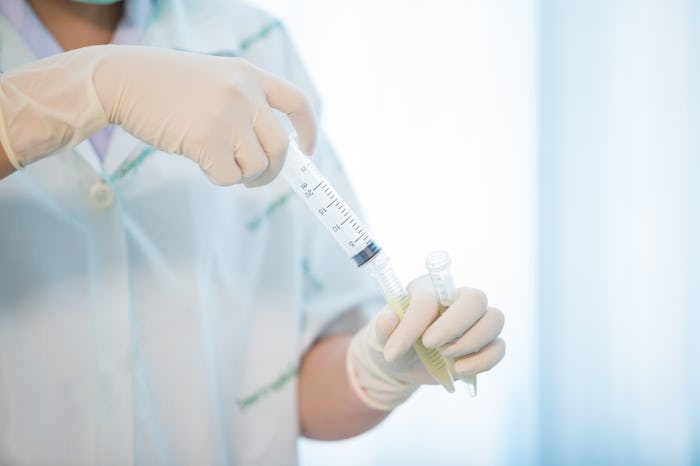Life

Here's What Amniocentesis *Really* Feels Like, According To 10 Moms
Of all the medical procedures you and your belly go through during your pregnancy, the amniocentesis might be one of the most cringe-worthy. And with good reason, since having a large needle inserted into your abdomen (right near your baby) is enough to freak anyone out. So if your OB orders an amnio, you might be afraid — and that’s completely normal. That’s why we asked these 10 moms to tell us all about their experiences. For example, does amniocentesis hurt? As it turns out, there's probably no need to worry.
But why would an OB order an amniocentesis, anyway? Well, there are a bunch of reasons, ranging from maternal age (i.e. if you’re older than 35), if genetic disorders run in the family, or if testing for genetic, chromosomal, or neural tube defect disorders came back with an abnormal or questionable result, according to the American Academy of Pediatrics (AAP). During the procedure, amniotic fluid from the uterus is collected via a needle. And while there are risks to having an amniocentesis (it can potentially cause amniotic fluid leaks, infection, or even a miscarriage, the Mayo Clinic reported), it's still almost 100% accurate in being able to detect genetic disorders, according to Parents.
Apart from the reasons why it’s important, what should you expect to physically feel if you need to have an amnio? “An amniocentesis should not be painful,” OB/GYN Dr. Renee Wellenstein M.D. tells Romper. “Typically, if a woman experiences any discomfort, it consists of only some mild cramping, like she would have with a menstrual cycle, or maybe some pressure.” Symptoms that are not okay: Severe cramping or pain, leaking fluid or blood vaginally, and fever are not normal, and a pregnant woman should consult her doctor immediately.
So knowing why it’s important and how it might feel, here’s what other women who have had an amnio said about the experience.
1Lesley
“It was no more painful than, say, a tetanus shot, and there was a minimal amount of pressure. I’ve had more painful pelvic exams than this.”
2Maria
“I felt lots of pressure, like someone was pushing on my stomach. But my doctor helped me to get through it by learning how to breathe properly, which helped to make the process less painful.”
3Laura
“The pinch from the needle hurt more than the actual procedure. But again, I’m petrified of needles, so that might have had something to do with it.”
4Vivian
“I didn’t feel anything at all, which was actually surprising, since I expected it to hurt like a mother. But the next day, my belly was sore.”
5Suzie
“During the amnio, I didn’t feel anything. It was a day later when I started getting cramping. That went away after some rest, and then I felt like myself again.”
6Michelle
“Even though I hadn’t had a period in months, that’s exactly what the amnio felt like — like my period was coming. I felt some cramping and pressure, but it went away a few hours after the amnio was done. It was a weird feeling, though.”
7Tina
“Maybe because I knew a large needle was right next to my baby, yes, I felt pain. I was also tense, which I’ve heard can make it worse. I cried the entire time. ”
8Diana
“I tried not to look at the needle as it was happening. But overall, it wasn’t nearly as bad as I imagined it would be. We’re planning on a second baby, so if my OB needs me to do it again, I’d do it in a heartbeat.”
9Jennifer
“What shocked me the most was the feeling of them removing the fluid. I got a weird, sudden pain in my back when they were doing it (even though the needle obviously wasn't put there). I would think it would have hurt where the needle was put, but no, it was in my back. So odd."
10Bree
“I think the buildup leading to the amniocentesis was far worse than the procedure itself. I was put on bed rest for the next day or so, though, and then my OB called and told me that everything came back normal, so that was a huge relief.”
Expert:
Dr. Renee Wellenstein, MD, an ob/gyn
This article was originally published on